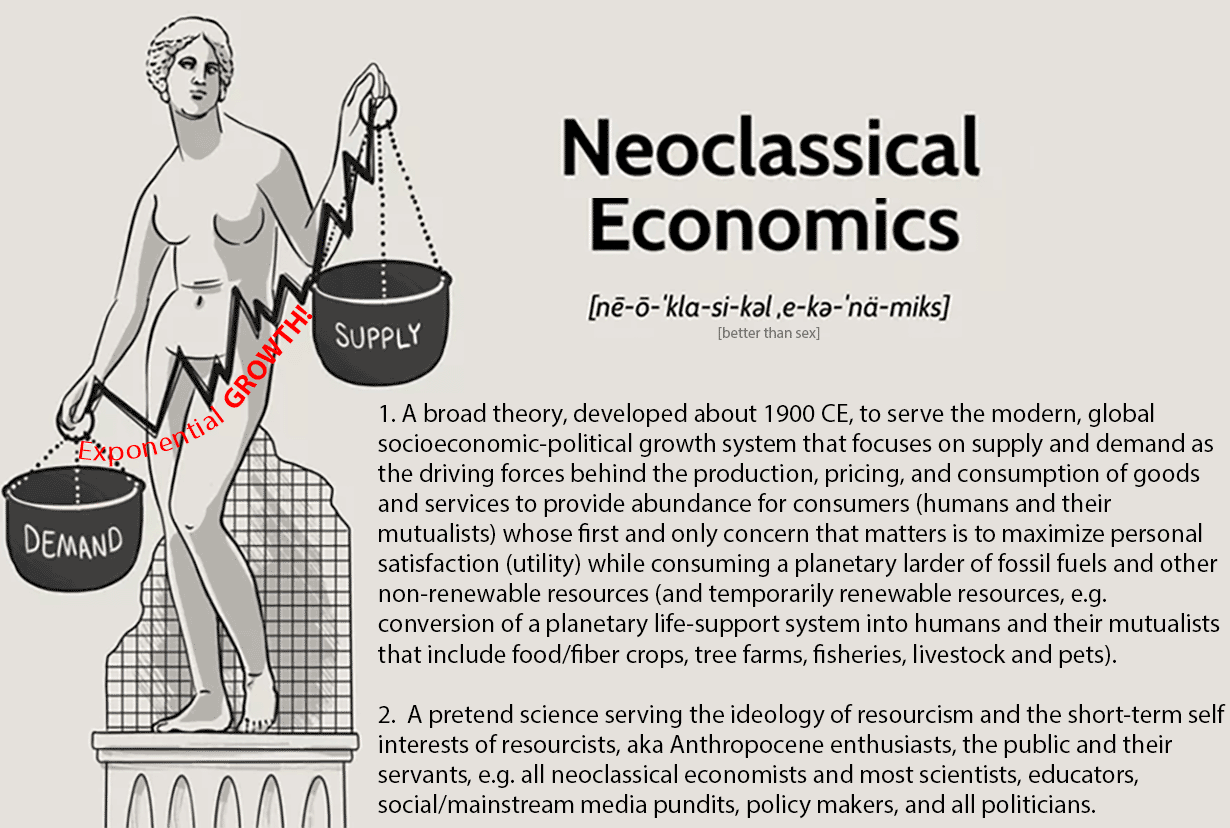A book by Charles W. Fowler
Sustainable human interactions with ecosystems and the biosphere, part 3
Inadequacy of Conventional Management
Charles Fowler contrasts systemic management with ‘conventional’ management. This reminds me of Charlie Hall’s usage of ‘conventional economics’ as alternative wording for ‘neoclassical welfare economics’. Both economists (of the neoclassical sort) and almost all managers/policy makers (other than of the systemic sort) exist to serve the system, aka the world socioeconomic-political system (WSS) and the modern techno-industrial (MTI) form of civilization all Anthropocene enthusiasts are products of, are part of, and serve (if they know what money is, value it, and likely have some).
When I was forced to take courses in neoclassical macro and micro economics in the early 1970s, required of all majors by the Schooling Gulag, I was confused. I had some crazy ideas about what ‘science’ was and I utterly failed to reconcile the science of economics with anything I thought I maybe knew about science (as way of finding things out). I assumed I was just too stupid to get it (NCE, neoclassical economics). If I wasn’t so stupid, I might have a chance to do something meaningful with my life, such as earn a Nobel Prize in economics, whose Truths everyone celebrated.
Some doubts, however, emerged when I noted evidence that not all scientists viewed NCE as a real science (I’m guessing the faint voice of protest was in a letter to the editor published in Scientific American when it was a less mainstream consensus-narrative serving publication).
Eventually I stumbled into a vast dissonant literature that viewed neoclassical economics as a pretend science. David Suzuki (you know, the eco-fascist know-nothing host of The Nature of Things for 44 years, whose job was not threatened by openly saying what many knew) was the first I knew of to express the crazy idea that I was maybe not entirely wrong (since the early 1970s) about everything.
William Rees noted in 2018 (a professor emeritus type and so, short of hiring a hitman, there wasn’t much the true believers could do other than ignore him), noted that David Suzuki was right (and Charles Hall agreed in the comments). As Hall noted: the “critiques of economics offered by David Suzuki and William Rees are just the tip of the iceberg of the criticisms available on the logic and methods of [conventional] economics. Many of these have come from economists themselves, from Coase to Piketty to many Nobel laureates in economics. For example Nobel laureate Wassily Leontief, said in 1984 ‘How long will researchers working in adjoining fields …abstain from expressing serious concern about the splendid isolation in which academic economics now finds itself’. He continues with how many economic models are unable ‘to advance, in any perceptible way, a systematic understanding of the structure and the operations of a real economic system’. Instead, they are based on ‘sets of more or less plausible but entirely arbitrary assumptions’ leading to ‘precisely stated but irrelevant theoretical conclusions’.”
And why isn’t the vast literature on the pretenses of neoclassical economics and conventional management as pretend science better known? Oh, because as E.O. Wilson (another know-nothing eco-fascist who was also a racist) notes “people would rather believe than know,” and then there is the Schooling Gulag, social and mainstream media, and the whole consensus storytelling social construct of error, ignorance, and illusion we all swim in and contribute to, e.g. by Liking, Sharing, Tweeting, and posting mere opinion on Medium.
And, Q.E.D., that’s my entitled opinion (about which Nature doesn’t care, so why should I?).
List of articles in this book review series: Systemic Management.





